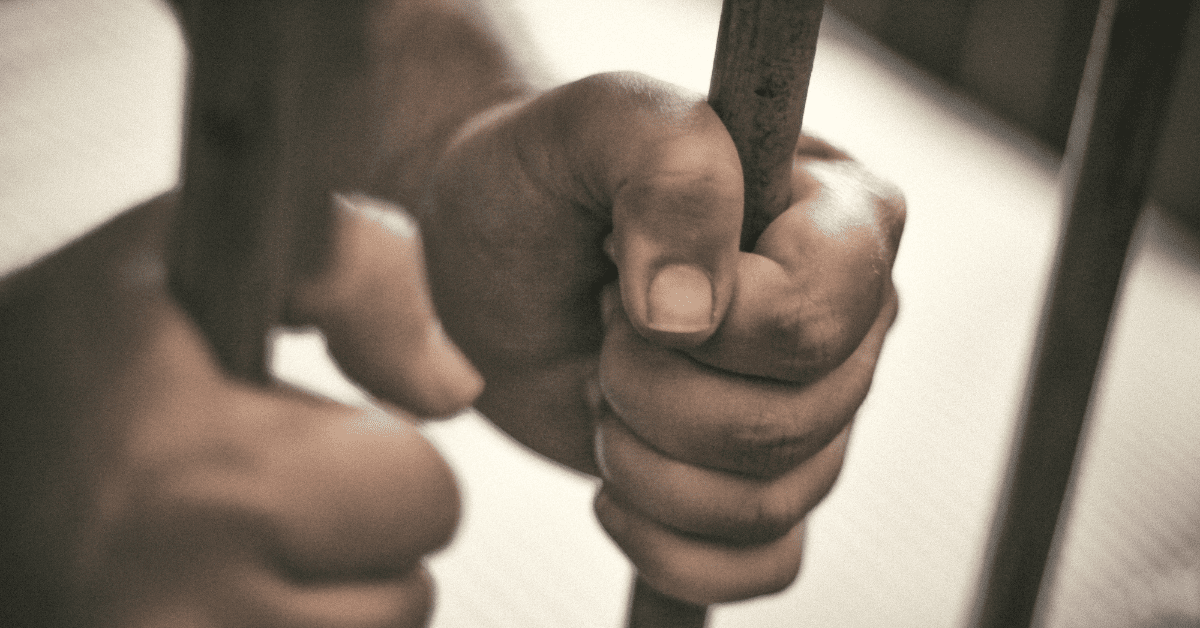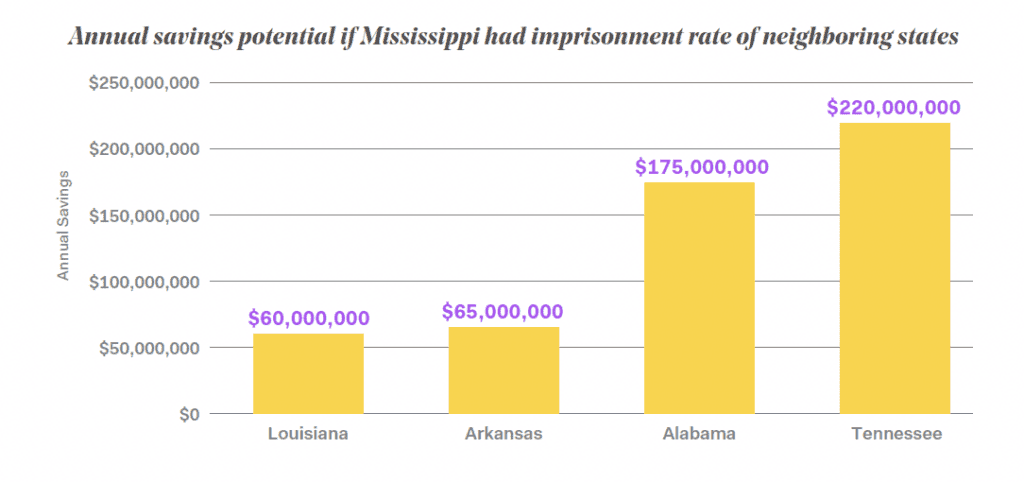
Mississippi has the highest incarceration rate in the nation as well as the lowest labor participation. Data indicates implementing additional criminal justice reforms could positively impact both.
A recent report by FWD.us, a bipartisan political organization, showed that Mississippi’s economic and workforce development could benefit from criminal justice reforms. The report highlighted that the state’s high incarceration rate hinders the state’s economy.
According to current U.S. criminal justice data, Mississippi has the highest rate of incarceration at 575 per 100,000 residents. Racial disparities are 2.6:1 for black over white incarcerations. While the incarceration rate is high, the data does not support that this effort actually increases public safety.
Impact on Economics and Crime
Ultimately, the report focuses on how removing individuals from the workforce, due to incarceration, undermines economic strategy. Incarceration not only impacts the person while in prison but makes it more difficult for them to find work once they are released.
“Mississippi’s business and elected leaders know how vital growing our economy and developing our workforce is to communities across the state, and this new report makes clear that pursuing commonsense criminal justice reforms will do both,” said Alesha Judkins, FWD.us Mississippi State Director. “Safely reducing Mississippi’s prison population will address our workforce challenges and boost the economic development Mississippians know is possible, while prioritizing public safety to help our communities thrive.”
Data shows that the nationwide push between the 1980’s and early 2000’s to expand the court and prison system and implement harsher punishments was not necessarily effective. Research indicates that incarceration is one of the least effective and most expensive ways to promote public safety.
The state continues to “double down” on that philosophy, according to the FWD.us report. There are currently 19,500 people in Mississippi prisons today. Of those, 59% are black, 39% are white and another 1% are identified as Hispanic.
The report noted that states who have made ongoing commitments to criminal justice reform have actually seen declines in prison population as well as crime rates.
While Mississippi has reached record low unemployment rates in recent months, Mississippi also has the lowest labor force participation in the U.S. at just 55.2% of the state’s working-age population. The state currently has roughly 85,000 job openings.
Empower Mississippi believes that incarceration plays a necessary role in our justice system but points out that Mississippi incarcerates more people per capita than anywhere else in the world.
“In many cases, there are more effective, less costly ways to improve public safety than incarceration, said Wil Ervin, Senior Vice President of Empower Mississippi. “If incarceration were the answer to improving public safety, Mississippi would be the safest place in the world. Other conservative states have simultaneously improved public safety and reduced incarceration, and conservative voters overwhelmingly support these efforts.”
Ervin added that more than 90% of inmates will be released, meaning a commitment to preparing those individuals for success when re-entering society is vital.
By the Numbers
It is estimated that roughly 660,000 Mississippi adults have a criminal conviction – that is 29% of the state’s population. Another 11% have a felony conviction and 5% have spent time in prison. Translating that to economic impact, it is estimated that the state’s small business sector loses $2.7 billion in earnings due to criminal convictions each year.

One issue discussed in the report is the impact of long prison terms and how they affect workforce as well as increased public safety.
“The extra months and years individuals spend behind bars due to Mississippi’s long sentences are time that people are not working and supporting their families and communities. This also keeps the state’s economy from reaching its full potential,” the report states.
A criminal record, particularly with a felony conviction, can reduce the chance for a call back from an employer by 50%. This number increases if jail time was incurred.
Formerly incarcerated people experience an unemployment rate of 27%, or nearly five times higher than the overall population. That rate is highest for black women at 44%. The report suggested these rates could be influenced by discouraging people from actively looking for work.
Reforms to Hiring Practices
“By working to advance commonsense policies and expand employment opportunities to currently and formerly incarcerated people just makes sense – not only to ensure our state has the workforce to power our economy but also to help reduce recidivism by ensuring our neighbors can contribute to their communities and take care of their families,” said Bradley Lum, Deputy Commissioner of Workforce Development for MDOC.
A national push from businesses like Kroger and Best Buy are promoting hiring practices that would give all candidates a fair shot, regardless of a prior conviction. This move lines up with a survey from the Society for Human Resource Management which found that 81% of businesses believe workers with a criminal record actually perform their jobs on par with or better than workers without a record.
The Mississippi Legislature has entertained efforts to “ban the box” on public sector employee applications. The last attempt was in 2020 through Senate Bill 2112. The bill would have removed the felony disclosure box on an initial application. It would have provided the opportunity for a criminal record to be disclosed at another point in the process.
At the time, Lt. Governor Delbert Hosemann indicated support for the legislation. He said removing the box would give an applicant the opportunity to sit down in person with an employer and explain their situation.
While the bill made it through much of the legislative process, it died in conference.
Financial Constraints
Those who have served a prison sentence also earn 52% less in their annual income than those who have not. These financial losses also have a statewide impact. With fewer dollars circulating in local communities it contributes to higher rates of poverty and economic stability.
“Mississippi residents are losing out on $2.7 billion in earnings due to their criminal records, and at least half of those earnings would likely be spent on things like food, clothing, and transportation, all of which are subject to sales tax. As a result, the state is losing an estimated $95 million each year in tax revenue,” according to the report.
Not only that, but Mississippi taxpayers spend over $400 million yearly to run the state prison system. On average it costs $21,600 for one person to be incarcerated each year. The current average sentencing for an individual in Mississippi’s prison system is 16 years, or a total cost of nearly $350,000 a person.
The FY 2024 appropriation to the Mississippi Department of Corrections was $434 million, an 11% increase over last year. The report indicated that the state cannot continue to sustain these costs.
Compared to neighboring states with more reforms, the report says Mississippi could save significant taxpayer dollars each year. These savings could range from $60 million to $220 million annually.

More to Do
The report found that while Mississippi does have some reforms, not all are being implemented to full capacity. If those measures were utilized, they could strengthen the state’s workforce while also increasing public safety. The report notes that such measures are a better utilization of taxpayer dollars.
While much of the report focused on how the high rate of incarceration is negatively impacting the state, it also offered several ways to move in the right direction. Those include:
- Reinstatement of driver’s license privileges
- Reduced barriers to licensing
- Fair chance hiring in Mississippi
- Expansion of earned release opportunities
The report concludes that by following evidence-based solutions Mississippi can reduce the scope of the prison and criminal justice system. The changes, the group says, would ultimately impact business, economy, and workforce across the state while also improving public safety through other measures.











